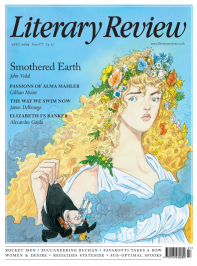Maren Meinhardt
From Tahiti to the Terror
Georg Forster: Voyager, Naturalist, Revolutionary
By Jürgen Goldstein (Translated by Anne Janusch)
University of Chicago Press 264pp £34
When Captain Cook set off in 1772 on his second voyage round the world, he was accompanied by the Prussian botanist Johann Reinhold Forster, who brought his seventeen-year-old son, Georg, with him as his assistant. Georg Forster’s role in Cook’s explorations transformed his life. Less than twenty years after that great journey, Forster died in Paris, impoverished and alone, having become caught up in the French Revolution. ‘So poor Forster did end up paying with his life for his errors,’ Goethe commented when he heard. But, according to Jürgen Goldstein in Georg Forster: Voyager, Naturalist, Revolutionary, Forster had not been led astray. In fact, Goldstein argues, his experiences on Cook’s voyage influenced his political thought and set him on the road to revolution.
Forster’s youth and relative lack of education meant that when Cook’s ship, HMS Resolution, set sail from Plymouth on 13 July 1772, he might have served as a near-perfect illustration of the Enlightenment idea of the human mind as a blank slate, something that Goldstein makes much of. There are signs, though, that Forster wasn’t always pleased to find himself in the role of experimental subject: ‘I was yoked too soon,’ he reflected later, and ‘forced to work when I still should have been learning’.
Georg Forster is not really a biography of Forster at all. The chronological facts are detailed, curtly and almost apologetically, at the beginning of each chapter, leaving Goldstein space to explore the development of Forster’s mind. Forster’s political ideas, he is keen to show, were formed not from

Sign Up to our newsletter
Receive free articles, highlights from the archive, news, details of prizes, and much more.@Lit_Review
Follow Literary Review on Twitter
Twitter Feed
Margaret Atwood has become a cultural weathervane, blamed for predicting dystopia and celebrated for resisting it. Yet her ‘memoir of sorts’ reveals a more complicated, playful figure.
@sophieolive introduces us to a young Peggy.
Sophie Oliver - Ms Fixit’s Characteristics
Sophie Oliver: Ms Fixit’s Characteristics - Book of Lives: A Memoir of Sorts by Margaret Atwood
literaryreview.co.uk
For a writer so ubiquitous, George Orwell remains curiously elusive. His voice is lost, his image scarce; all that survives is the prose, and the interpretations built upon it.
@Dorianlynskey wonders what is to be done.
Dorian Lynskey - Doublethink & Doubt
Dorian Lynskey: Doublethink & Doubt - Orwell: 2+2=5 by Raoul Peck (dir); George Orwell: Life and Legacy by Robert Colls
literaryreview.co.uk
The court of Henry VIII is easy to envision thanks to Hans Holbein the Younger’s portraits: the bearded king, Anne of Cleves in red and gold, Thomas Cromwell demure in black.
Peter Marshall paints a picture of the artist himself.
Peter Marshall - Varnish & Virtue
Peter Marshall: Varnish & Virtue - Holbein: Renaissance Master by Elizabeth Goldring
literaryreview.co.uk